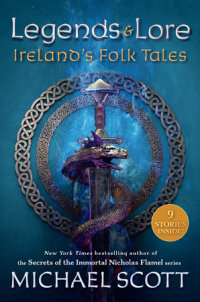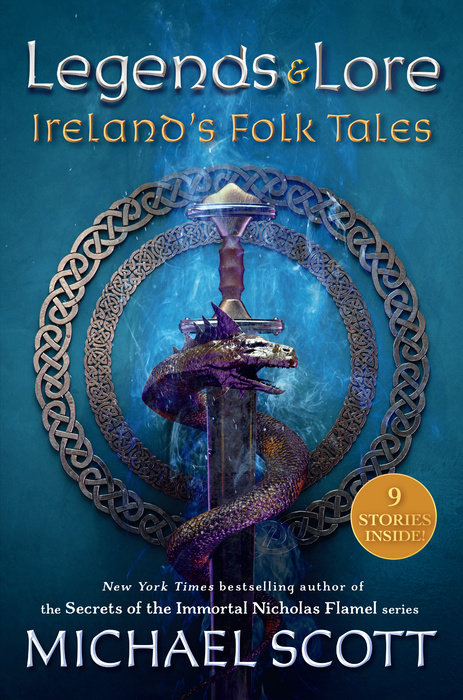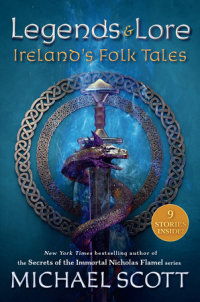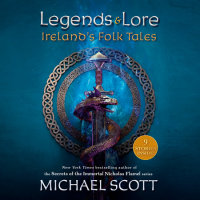Legends and Lore
Myths, legends, and magic are woven together in a collection of enthralling Irish folktales from the New York Times bestselling author of the Secrets of the Immortal Nicholas Flamel series.
A competition to become King of the Leprechauns... A trick designed to fool the Queen of the Fairies... A terrifying lake monster confronted by the unlikeliest of heroes...
Nine Irish legends come to life in these timeless, action-packed folktales about mythological creatures and epic heroes. A master of Irish mythology, bestselling author Michael Scott has crafted stories guaranteed to enthrall young readers who love magic, legends, and lore.
And don't miss the companion collection of Irish fairy tales, Magic & Myth!
An Excerpt fromLegends and Lore
King of the Leprechauns
One cold, bitter night—when the stars were hard and sharp and brilliant, spelling out their patterns across the skies—the Small Folk came to the land of Erin in the metal ships of the Tuatha De Danann. As humans measure time, that was many thousands of years ago, though the Small Folk are long-lived and so it may seem like less time to them. This is the story of their coming, and of the next great king of the leprechauns . . .
The leprechauns came to the tiny island that would one day become the land of Erin when the world was young. They had traveled across the vast western sea from the land of the De Danann folk, which they had been forced to flee when the ground started shifting and moving. In a single night, the mountains had spat fire and churning mud had burst up from the sea bed; the seas had risen and the waters had turned to boiling. Many of the De Danann folk believed that they had angered their terrible goddess, the Lady Danu, but no one knew how or why.
The Small Folk, who knew the ways of the wind and waves, the patterns of the earth and rivers, knew that the island of the De Danann was threatened with destruction. And so, while others huddled in their cellars and temples, praying to their goddess, the leprechauns had loaded up the huge metal ships with goods and tools, with sacks of grain, dried meat, and hard bread, with healing herbs and the seed of rare trees and bushes, and a few of the ancient books and charts of the De Danann. And they sailed away just in time.
On the morning of the fifth day since they had sailed from the isle of the De Danann, Niall, the king of the leprechauns, called his sons together. The king was the oldest of the Small Folk—some even said he was the oldest creature in the world, that he had walked the world in the time of the dragons, before the first humans had appeared. He was taller than most of the Small Folk; his back was straight, his hair and beard were snow white, and only his face, which was a mass of wrinkles, betrayed his great age.
The king had two sons, but they were half brothers who looked nothing alike. One was named Gilla, whose mother had been from the fir dearg, the Red Folk tribe: he was small and red-faced with a large bulbous nose and a mass of red hair and freckles. His clothing was of differing shades of red and bronze, and his temper was just as fierce.
And then there was Seamus Ban. His mother had been Niall’s second wife, and she had been from the leprechaun tribe, which made Seamus a full-blooded leprechaun. Seamus was tall and thin, with coal-black hair.
When Seamus and Gilla were called, their father was standing in the prow of the boat, his left arm wrapped around the neck of the huge dragon-shaped figurehead, his right hand shading his eyes. He peered through the shifting clouds of fog and dust that had surrounded the ships since they had left the De Danann isle. Seamus stood on his father’s right-hand side, while Gilla took up the position on his left.
Without looking at either of them, Niall spoke very softly. “We must find land soon. Our supplies cannot last much longer.”
He suddenly turned around and leaned with his back against the figurehead, his arms folded across his barrel chest. He looked at each of the boys in turn. When he spoke again, his voice was low and serious. “You know that there will come a day when I will leave this world and go on the last great journey that every living creature makes. I am no longer young, and that day draws ever nearer. I must choose a successor—I must decide which one of you will be King of the Small Folk, king of the leprechauns.”
“I am the firstborn,” Gilla said immediately.
Niall nodded. “You are, but you are not pure-blooded leprechaun. And while Seamus Ban is, he is the second born. If the truth is to be told, then neither of you can claim kingship. However, I have reached a decision . . .”
“What sort of decision?” Seamus asked quietly. He was aware that his half brother was glowering at him, his face becoming redder and redder. Gilla was two years older than Seamus, and there was little brotherly love between them.
“I have decided to set both of you a task. Whichever one of you completes that task will be the new king of the leprechauns.”
“That sounds easy enough,” Gilla said. “I’m stronger and faster than Seamus Ban, so it should be no problem.”
Niall smiled. “Ah, but I’m not going to give you a simple test of strength or speed; this task will require skill and cunning.” He stepped away from the figurehead and took two steps before he stopped and looked back at the half brothers. “Whoever finds land—new land, fresh green land—for our people will be the next king of the leprechauns.”
And then he turned and walked away, leaving the half brothers looking at each other in amazement. Finally, Gilla left, too. “Don’t bother looking,” he told Seamus roughly. “I will find the land. I will be king of the leprechauns.”
In the days that followed, both Gilla and Seamus poured over the few De Danann books and charts that had been brought along, looking for anything—a clue, a hint, a suggestion—that might give them some indication of where new land might lie.
They found nothing.
Finally, Seamus decided that there was nothing more he could do—the charts showed nothing, the sailors knew nothing. Maybe there was no land, he thought. Maybe they were doomed to sail on until they fell off the edge of the world.
Seamus went and stood beside the figurehead, staring out at the great banks of fog, listening to the waves slapping against the sides of the craft, and dreaming of land.
And that was when he spotted the bird.
For a single moment, Seamus wondered if it was a figment of his imagination and the fog. It was the first creature he had seen since the Small Folk had left the De Danann isle. And where there were birds, there was land . . .
Seamus’s excited shouts brought the whole crew running, but by the time they had gathered around, the bird had vanished back into the fog.
He pointed into the shifting wall of gray. “There was a bird, a seabird, with a black head and black-tipped wings,” he shouted excitedly. “It must have been heading toward land . . .”
“Well, there’s no bird there now,” Gilla said, his eyes small and black in his red face.
“There was!” Seamus insisted.
“I don’t believe you,” his half brother said with a sneer.
Niall raised both hands. “Tell us,” he said quietly, “which way did it go?”
Seamus pointed with his right hand.
“And when you saw it, was it moving in a straight line?”
The taller boy nodded.
Niall looked at the navigator. “Follow that course.”
“But, sire,” the leprechaun navigator protested, “we could be turning in a circle . . .”
“Follow it!” Niall commanded.
The metal craft swung ponderously in the gray ocean and followed the direction Seamus had given. It held to that course for the rest of the morning. At first most of the leprechaun crew lined the rails, anxiously peering through the shifting banks of fog, but there were no further sightings of the bird.
And there was no sign of land.
Seamus’s stomach felt as though it had been filled with pebbles of uncertainty.
Around noon, when even the king was beginning to look doubtful, and Gilla’s smile was becoming broader and broader, Seamus caught a flicker of movement out of the corner of his eye. Shading his eyes with his hand, the boy squinted hard . . .
A large black-headed seabird had appeared out of the fog, its broad wings beating strongly.
Moments later the fog cleared and a small green island rose up out of the sea before them. The Small Folk started cheering, and their joyous cries echoed across the waters.
Seamus was a hero. He would be the next king of the leprechauns . . . for he had discovered the island that would one day become the land of Erin.



